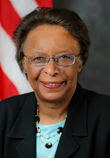User:KarissaJones16/sandbox
Cora Bagley Marrett (1942 – present) is an African American woman who is known for her work in sociology and for the National Science Foundation. From May 2011 until August 2014, Marrett served as the Deputy Director of the National Science Foundation.[1]
Cora Bagley Marrett | |
|---|---|
 | |
| Born | 1942 Kenbridge, Virginia |
| Alma mater | Virginia Union University (BA) University of Wisconsin-Madison (PhD) |
| Occupation | Sociologist |
Biography
[edit]Early life
[edit]Cora Bagley Marrett was born in 1942 in Kenbridge, Virginia. Her parents only had a sixth grade education and Marrett was the youngest of 12 children.[2]
Education and career
[edit]Marrett received her undergraduate degree from the historically black Virginia Union University in Richmond, Virginia. She pursued her advanced graduate degrees from the University of Wisconsin-Madison. While at the University of Wisconsin-Madison, she researched organizational effectiveness, alone with race relations. Once she received her degrees, Marrett remained at the University of Wisconsin-Madison as a professor of Sociology and Afro-American Studies from 1974 until 1997. She has help tenure at the University of Wisconsin-Madison since 1974.[2] Around this time, Marrett also completed a fellowship at the Center for Advanced Study in the Behavioral Sciences in Stanford, California. Following this, Marrett directed the United Negro College Fund/Andrew Mellon Programs from 1990 until 1992. She also taught at Western Michigan University and the University of North Carolina prior to being at the University of Wisconsin-Madison.[3]
Marrett held other jobs during this time as well. From 1992 through 1996, Marrett also worked for the National Science Foundation as the Assistant Director for Social, Behavioral, and Economic Studies. Marrett transitioned into a new position again in 1996 when she was called upon to sit on the Board of Governors of the Argonne National Library while also being a member of a peer-review group for the National Institutes of Health, in which she remained until 1998. In 1997, Marrett took leave from the University of Wisconsin-Madison and moved to the University of Massachusetts-Amherst as Provost, Senior Vice Chancellor of Affairs, and a professor of Sociology and Afro-American Studies, where she remained until 2001.[4] In May 2011, Marrett returned to the National Science Foundation as the Deputy Director. She held this position until August 2014. Before 2009, she was also the Assistant Director for Education and Human Resources.[5] Marrett has served on numerous academic and governmental committees including the National Academy of Sciences-National Research Council, the President’s Commission on the Accident at Three Mile Island, the National Science Foundation, the U.S. Department of Defense and the U.S. Congress.[3]
Published works
[edit]- Women's Occupational Health: The Rise and Fall of a Research Issue [6]
- Research in Race and Ethnic Relations: A Research Annual [7]
- Minority Females in High School Mathematics and Science [8]
- Teacher Goals and Race/Sex Equity in Mathematics and Science Education: The Final Report [9]
- Gender Influences in Classroom Interaction [10]
- The Organizational Context of Higher Order Thinking [11]
- Letter Report: Protecting Participants in Behavioral and Social Science Research [12]
Awards
[edit]While working for the National Science Foundation from 1992-1996, Marrett was awarded the Distinguished Service Award.[5]
In 1996, Marrett received an honorary Doctorate from Wake Forest University and became a member of American Association for the Advancement of the Sciences.[4]
In 1998, she became a fellow of the American Academy of Arts and Sciences.[4]
Marrett was also a Distinguished Alumni Award Honoree in 2012 from the University of Wisconsin.[13]
While at Western Michigan University, she was nominated for a University Teaching Award.[3]
References
[edit]- ^ "US NSF - News - Cora B. Marrett Biography, Deputy Director, National Science Foundation". www.nsf.gov. Retrieved 2015-04-07.
- ^ a b Brannon, Jody (16 July 2012). "Cora Marrett, Director (acting)". National Journal. Retrieved 8 April 2015.
- ^ a b c "Cora Bagley Marrett Named New Provost at UMass Amherst Effective Aug. 1". UMassAmherst. University of Massachusetts Amherst. 5 June 1997. Retrieved 9 April 2015.
- ^ a b c "Cora Bagley Marrett". African American History Program. Retrieved 6 April 2015.
- ^ a b "US NSF - News - Cora B. Marrett Biography, Deputy Director, National Science Foundation". www.nsf.gov. Retrieved 2015-04-09.
- ^ Hricko, Andrea M; Marrett, Cora Bagley (1975). Women's occupational health: the rise and fall of a research issue. [publisher not identified]. Retrieved 2015-04-09.
- ^ Marrett, Cora Bagley; Leggon, Cheryl (1979). Research in race and ethnic relations: a research annual. Jai Press. Retrieved 2015-04-09.
- ^ Marrett, Cora Bagley (1982). Minority females in high school mathematics and science. [Wisconsin Center for Education Research, University of Wisconsin]. Retrieved 2015-04-09.
- ^ Marrett, Cora Bagley (1985). Teacher goals and race/sex equity in mathematics and science education: final report. Wisconsin Center for Education Research, School of Education, University of Wisconsin--Madison. Retrieved 2015-04-09.
- ^ Wilkinson, Louise Cherry, ed. (1985). Gender influences in classroom interaction. Academic Press. ISBN 0127520759 9. Retrieved 2015-04-09.
{{cite book}}: Check|isbn=value: length (help) - ^ Marrett, Cora Bagley; Kim, Gyu-Won (1986). The organizational context of higher order thinking. [National Center on Effective Secondary Schools]. Retrieved 2015-04-09.
- ^ Marrett, Cora Bagley; Panel on Institutional Review Boards, Surveys, and Social Science Research (2002). Letter report protecting participants in behavioral and social science research. National Academy Press. Retrieved 2015-04-09.
{{cite book}}: Missing|author2=(help)CS1 maint: multiple names: authors list (link) - ^ "Cora Marrett MA'65, PhD '68 | Wisconsin Alumni Association". www.uwalumni.com. Retrieved 2015-04-09.
